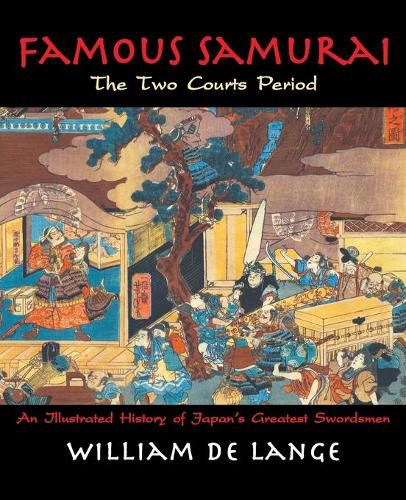Readings Newsletter
Become a Readings Member to make your shopping experience even easier.
Sign in or sign up for free!
You’re not far away from qualifying for FREE standard shipping within Australia
You’ve qualified for FREE standard shipping within Australia
The cart is loading…






This title is printed to order. This book may have been self-published. If so, we cannot guarantee the quality of the content. In the main most books will have gone through the editing process however some may not. We therefore suggest that you be aware of this before ordering this book. If in doubt check either the author or publisher’s details as we are unable to accept any returns unless they are faulty. Please contact us if you have any questions.
The Two Courts Period (1333-92) was a turning point in Japan’s medieval era-a time when an unbridgeable rift appeared in the fragile fabric of Japanese feudal society. On each side stood a separate imperial court, each with its own army and its own agenda. As the schism deepened and the positions hardened, one by one clans and domains were rent asunder until each and every man faced the terrible choice between loyalty and friendship.
Two such men were Nennami Okuyama Jion and Chujo Hyogo no Kami Nagahide, who faced each other from across the dazzling divide. Jion, an impoverished warrior monk who had lost his father through the treachery of a Bakufu official, joined the side of the loyalists, the forces fighting on behalf of the Southern Court. Nagahide, whose ancestors had stood at the cradle of feudal society and had risen to high rank within the Bakufu, was bound by duty to the Northern Court.
Their stories, set against the greater historical backdrop of ruthless political intrigue and vast military campaigns, describe the tragedy of civil war experienced at the personal level; they tell of loyalty, of betrayal, and of seemingly insurmountable setbacks. Yet the friendship between these two so disparate men, founded on their mutual love of swordsmanship and forged in the midst of a chaotic world, stands as moving testimony to the kind of courage that can have no equal in times of peace.
$9.00 standard shipping within Australia
FREE standard shipping within Australia for orders over $100.00
Express & International shipping calculated at checkout
This title is printed to order. This book may have been self-published. If so, we cannot guarantee the quality of the content. In the main most books will have gone through the editing process however some may not. We therefore suggest that you be aware of this before ordering this book. If in doubt check either the author or publisher’s details as we are unable to accept any returns unless they are faulty. Please contact us if you have any questions.
The Two Courts Period (1333-92) was a turning point in Japan’s medieval era-a time when an unbridgeable rift appeared in the fragile fabric of Japanese feudal society. On each side stood a separate imperial court, each with its own army and its own agenda. As the schism deepened and the positions hardened, one by one clans and domains were rent asunder until each and every man faced the terrible choice between loyalty and friendship.
Two such men were Nennami Okuyama Jion and Chujo Hyogo no Kami Nagahide, who faced each other from across the dazzling divide. Jion, an impoverished warrior monk who had lost his father through the treachery of a Bakufu official, joined the side of the loyalists, the forces fighting on behalf of the Southern Court. Nagahide, whose ancestors had stood at the cradle of feudal society and had risen to high rank within the Bakufu, was bound by duty to the Northern Court.
Their stories, set against the greater historical backdrop of ruthless political intrigue and vast military campaigns, describe the tragedy of civil war experienced at the personal level; they tell of loyalty, of betrayal, and of seemingly insurmountable setbacks. Yet the friendship between these two so disparate men, founded on their mutual love of swordsmanship and forged in the midst of a chaotic world, stands as moving testimony to the kind of courage that can have no equal in times of peace.